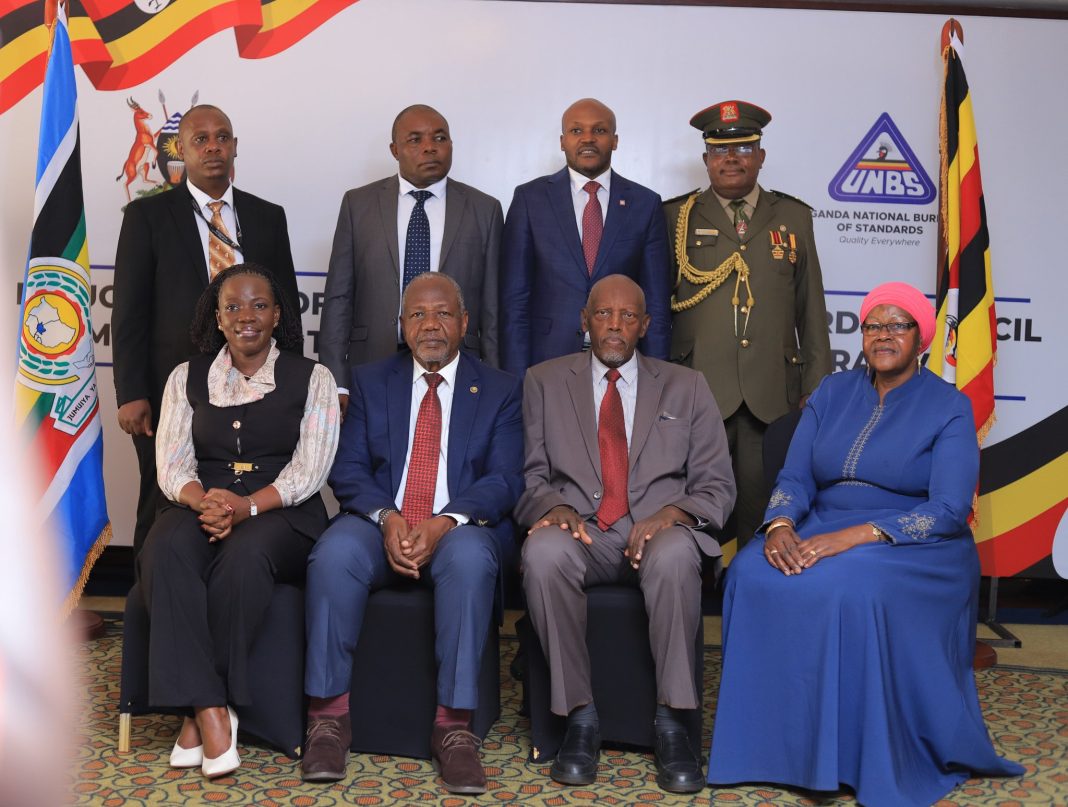By David Mwanje
KAMPALA– Uganda is doubling down on its mission to elevate the quality of its goods and boost its global trade standing with the inauguration of the 10th National Standards Council (NSC), the top governing body of the Uganda National Bureau of Standards (UNBS). Led by Chairperson Eng. James Kalibbala, the new council was sworn in by Minister of Trade, Industry, and Cooperatives, Francis Mwebesa, in a vibrant ceremony that set the tone for a transformative era in Uganda’s standardization journey.
Minister Mwebesa charged the council with a bold mandate: safeguard consumers and the environment by ensuring locally manufactured goods meet rigorous standards. “Help businesses comply through capacity-building programs, conduct regular factory inspections, and educate the public on the value of UNBS-certified products,” he urged. His vision aligns with Uganda’s ambitious economic goals, including the Parish Development Model (PDM) and the National Development Plan IV, which prioritize value addition to drive economic growth. By enhancing product quality, Uganda aims to make its coffee, tea, and manufactured goods more competitive in markets like the East African Community (EAC) and the African Continental Free Trade Area (AfCFTA), where trade opportunities are worth over $3.4 trillion.
State Minister Gen. Wilson Mbasu Mbadi reinforced this call, urging the NSC to build a robust quality infrastructure to fuel export growth, reduce reliance on imports, and spur industrialization. “UNBS is the backbone of Uganda’s trade ambitions,” he declared, emphasizing standardization as a catalyst for economic transformation.
Eng. Kalibbala, the new NSC Chairperson, accepted the challenge with enthusiasm, pledging to restore UNBS’s reputation and foster partnerships to drive progress. “We’ll build on past successes and work with all stakeholders to make quality the hallmark of Ugandan products,” he said, his voice brimming with determination.
At the heart of UNBS’s renewed focus is a commitment to empowering Micro, Small, and Medium Enterprises (MSMEs), which make up over 90% of Uganda’s businesses and employ millions. UNBS Executive Director Eng. James Kasigwa unveiled a fresh value proposition: “Growing Quality MSMEs.” “We’re not just setting standards; we’re holding hands with startups and small businesses, training them to meet market demands,” Kasigwa explained. This initiative could be a game-changer for Uganda, where MSMEs contribute 80% of GDP but often struggle with compliance due to limited resources.
The new NSC, a dynamic mix of expertise, includes Vice Chairperson Dr. John Patrick Kabayo, ex-officio members Maj. Dr. Atwoki John Mathais Rusoke Tagasgwire and Mr. Ainebyona Denis, alongside Ms. Hawa Nsubuga Lule, Prof. Mnason Tweheyo, and Ms. Stella Nyapendi Chombo. With Eng. Kasigwa serving as Secretary, the council is tasked with setting standards, certifying products, and advising the Minister on policies to elevate Uganda’s quality framework.
Why It Matters
This new chapter for UNBS comes at a critical time. Uganda’s exports, valued at $1.8 billion in 2023, face fierce competition in global markets, where substandard goods can lead to costly rejections. By strengthening factory inspections and promoting certified products, the NSC aims to protect consumers from unsafe goods while boosting Uganda’s trade credibility. For instance, ensuring coffee—Uganda’s top export, worth over $350 million annually—meets international standards could unlock premium markets in Europe and Asia.
The council’s focus on MSMEs aligns with Uganda’s push for inclusive growth under the PDM, which seeks to transform rural economies. By training small businesses to meet standards, UNBS could help farmers and manufacturers add value to products like maize, dairy, and textiles, creating jobs and reducing poverty.
As Uganda vies for a seat on the International Organization for Standardization (ISO) Council in October 2025, the NSC’s work will amplify the nation’s voice in global trade. A stronger quality infrastructure could also reduce trade barriers within the AfCFTA, where harmonized standards are key to unlocking intra-African trade potential.
With the 10th NSC at the helm, Uganda is poised to turn quality into its competitive edge, paving the way for a future where “Made in Uganda” stands for excellence, innovation, and trust.
From Kampala’s factories to global markets, Uganda’s new standards council is ready to spark a quality revolution.























